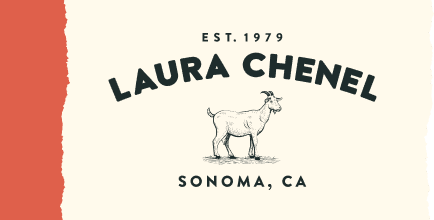

The first goat cheese was made thousands of years ago. When invading Moors were driven out of France in the 8th century, they left behind their goats. In the Loire Valley, farmers began tending to the goats and used their milk to make cheese. These methods became the cornerstone of modern goat cheese.


Our goat cheese has a tangy taste that brightens any dish. Each creamy bite contains vitamins A and B, riboflavin, calcium, iron, phosphorus, magnesium, and potassium, as well as helpful probiotics that make it easier to digest than cow's milk.
Once we have the best milk, we rely on time and attention to detail to make great cheese. Our cheese team's skills are just as strong as their love of cheese. Every step, from setting the curd to draining (for the perfect consistency) and aging (for amazing flavor), is essential to the process.


The key to great cheese is the best milk. Laura Chenel only sources from family farms in the U.S.—California, Oregon, Nevada and Idaho. We partner exclusively with our farmers and provide support and technologies for happy goat and delicious milk.
Yes, all of our cheeses are gluten-free.
Our following products are certified Kosher by Kashruth Certification: Chabis (all varieties), Logs (Original, Garlic & Chive, Orange Blossom Honey), Spreadable Goat Cheese/Chef's Chèvre (all varieties), Medallion (Original, Garlic & Chive), Marinated Goat Cheese (Thyme & Rosemary, Jalapeño Chili), Ash-Rind Buchette and Crottin.
Yes. All of our products are pasteurized. U.S. law requires that all fresh cheeses that are aged less than 60 days must be pasteurized.
Our products are not organic; however, our products are made with all-natural, fresh, domestic milk in sustainable conditions in our LEED Gold-certified dairy.
Yes. Cheese is made from milk with an added bacterial culture. This culture consumes almost all of the lactose in the milk while producing a distinct flavor. When cheese is made, the culture converts the lactose, or milk sugar, into lactic acid. Generally speaking, goat milk contains slightly less lactose than cow milk, but it's always good to check with a doctor before eating goat cheese if you are sensitive to lactose.
We only use a microbial (non-animal) rennet, suitable for vegetarians, to make our cheeses.
We do not add vitamins to our products; however, vitamin D is already in the milk. Products such as butter, cheese, eggs and fish are the richest sources of vitamin D.
Of course, we use milk, but our products are free from eggs, peanuts, tree nuts, fish, shellfish, soy, wheat and gluten.